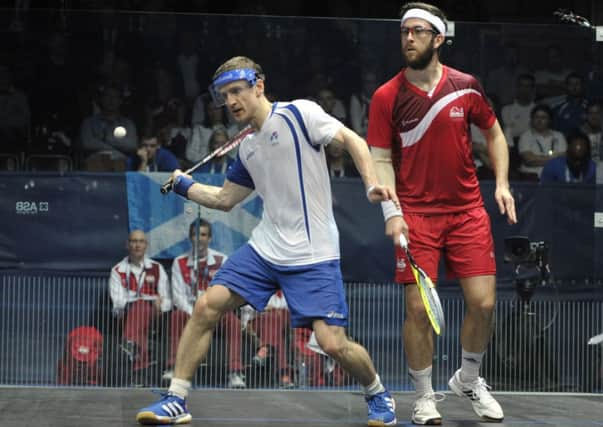Glasgow 2014: Aussie duo grab final gold in squash


Ten days and around five hours after the first gold of these Commonwealth Games was corralled by English triathlete Jodie Stimpson amid the environs of Strathclyde Park, the honour of receiving the last fell to Australia’s Cameron Pilley and David Palmer as they departed the Glass Box at Scotstoun as squash’s men’s doubles champions.
The latter had waited an entire career for one triumph to come along after previously acquiring two silvers and four bronzes. In quick succession, he could twice rejoice, having earlier paired with Rachael Grinham to defeat England’s Peter Barker and Alison Waters 11-8, 11-10 to secure the mixed doubles title. If they were smarting Down Under at allowing their great rivals to end their run at the top of the medals table, then at least a little late retribution was gleefully taken.
Advertisement
Hide AdAdvertisement
Hide AdPalmer, the 38-year-old who came out of retirement for one last attempt to satiate his Commonwealth cravings, leapt with euphoria as he and Pilley out-lasted their English challengers Nick Matthew and Adrian Grant 10-11, 11-7, 11-9 in a fittingly combative conclusion to competition at Glasgow 2014.
“It certainly doesn’t get much better,” said Palmer, the former world number one. “I almost ran out of gas. My legs were getting a little twitchy and a little crampy near the end there.
“Cameron really stepped it up in the middle of that last game and he is such an aggressive player with his power and touch. I was encouraging him to trust his shots and I thought he played some really great shots. He really stepped up when we needed him.”
There was to be no final fling for the Scottish pair of Alan Clyne and Harry Leitch. Fourth in Delhi, fourth – again – in Glasgow, their loss in the playoff for men’s doubles bronze was a bitter pill to ingest. Facing England’s James Willstrop and Darryl Selby, rallies were so prolonged that you feared the quartet would bump the closing ceremony onto the red button, a series of lets and replays injecting a fatigue booster into already tired limbs.
The screams of a small child broke through the tension. The next yelp was from Clyne, an accidental clash of rackets with Selby shattering his visor with the Scots trailing 8-7 in the opening set. “Those eye masks, they stick out a little bit further than normal,” the Englishman noted. “It was probably lucky he had it on.” Good fortune was not his friend. In the second, he required medical attention after sliding precariously through the sweat on the court.
These were the small margins and tiny gains which might, on reflection, have tilted the balance. “It’s hard to really remember the little points that occurred,” Clyne acknowledged. “There wasn’t much between the teams in doubles. It can swing one way or another, and unfortunately on this occasion, it swung towards them.”
Edinburgh-born Leitch, now aged 29, had nothing left except disappointment. A qualified doctor with a sideline in stem cell research in Cambridge, he has juggled career and sporting sideline to arrive at an identical diagnosis. “It hurts,” he declared. “We came here for a medal. We came fourth last time. We’ve had four years of incredibly hard work that you can’t imagine. We’re utterly gutted. It’s a gaping wound and we’re done.”
He will ponder whether to continue or retire quietly to the laboratory. “I’m not sure Alan will want me in four years,” he smiled. “We’ll sit down and have a discussion over a beer.” For squash’s leading lights, there is no Olympics to look forward to, just the grind of the circuit. Unless the IOC reconsiders its stance, they will never grace sport’s ultimate stage.
Advertisement
Hide AdAdvertisement
Hide AdPrevious applications have been rejected. The reception received at the Commonwealths might once again prise open the door. “I would hope so,” Clyne said. “It’s been a fantastic arena. I don’t know if I’ll ever get to play in somewhere like this again.” In the women’s doubles final, Malaysia’s Vivian Hoo and Khe Wei Hoon out-lasted India’s Ashwini Ponnappa and Iwala Gutta 23-21 to claim victory in straight sets. Inside the box that rocked, theirs was elation unlimited. The Perspex shell that has seen so many shine during these Games will be quickly dismantled and shipped off, leaving no trace behind.
If some legacy is to be derived, then monies will be needed to prove the sport’s greats with reason to return. “We just hope that Scotland will buy itself one of these glass courts, build itself a proper squash arena, and give all these fantastic athletes, these young guys coming through, the impetus they need to get us that elusive medal next time,” Leitch added. “We need investment and support for some of the best athletes in the country.”